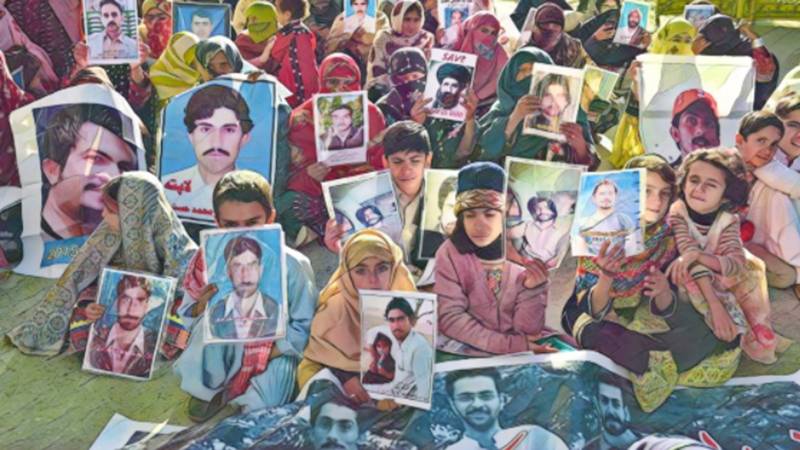
In the blessed month of Ramazan, life assumes an extraordinary hue for people around the world. However, for the Baloch, Ramazan and Eid do not bring the opportunity to express inner joy in their homeland. Instead of experiencing the wonders and awe-inspiring glory of Ramazan, families in Balochistan mark the occasion with endless tears for their loved ones who have been forcibly disappeared and extrajudicially killed in Pakistan. Each passing year unveils a new chapter of enforced disappearances and extrajudicial killings, as Baloch people witness their loved ones languishing in multifarious torture cells across Pakistan.
A recent incident has further underscored the deteriorating situation in Balochistan. Two individuals, Zaman and Shoaib, who were forcibly disappeared last August from their homes in Karachi in front of their families, were extrajudicially killed. Reports from X (formerly Twitter) indicate that Pakistani police visited their homes promising good news about Zaman and Shoaib for Ramazan. Yet, tragically, their blindfolded and bullet-riddled corpses were discovered dumped in Karachi. This is not an isolated incident but rather part of a pattern witnessed by the people of Balochistan. Consider the case of Balach Mola Baksh, who was shot dead by the Counter Terrorism Department in Turbat after spending 10 days in police custody.
Moreover, the enforced disappearances of Baloch students from various educational institutions in Pakistan are deeply alarming. The recent case of Khuda Dad Siraj, detained from Sargodha, Punjab, paints a grim picture for young students seeking to pursue academic life in Balochistan. The increasing trend of enforced disappearances among Baloch students in educational institutions in Islamabad and Punjab is profoundly concerning. Detaining students in educational settings not only inflicts agony upon their families but also instantly derails their academic and professional aspirations.
Violence in the form of enforced disappearances and extrajudicial killings have become a grim reality for the Baloch community in Pakistan over the past two decades. Since the resurgence of the long-standing ethno-nationalist insurgency in the early 2000s, thousands of Baloch individuals have been forcefully disappeared, and hundreds have met brutal ends, their lifeless bodies left on desolate mountains or deserted roads. Many of these victims bore harrowing signs of torture, with broken limbs, bruised faces, and flesh marred by cuts or punctures, some even defiled with slogans like “Pakistan Zindabad” scrawled across their backs.
It is an undeniable truth that enforced disappearance constitutes a consistent state policy. Firstly, the Pakistani state itself established the Commission of Inquiry on Enforced Disappearance back in 2010, a body that remains operational shockingly after more than 13 years. Up to August 2023, the commission had received 9,967 cases, with 2,708 originating from Balochistan. A scrutiny of these cases reveals that enforced disappearances, by definition, entail abductions and detentions carried out by state officials.
Moreover, acknowledging the gravity of the issue, the state established the Federal Task Force on Missing Persons in 2023 to provide recommendations for resolving the problem. However, despite this admission of concern, the number of cases reported to the commission continues to rise each month, with 157 cases in July 2023 and 74 in August 2023, indicating a troubling trend. This trend paints a distressing picture of a state where, instead of making strides in eliminating the scourge of enforced disappearance, the commission serves as a platform for rationalising and perpetuating constitutional injustices.
Regrettably, a state resorting to enforced disappearances in an attempt to quell nationalism is more interested in suppression than resolution. Furthermore, it is evident that successive administrations, including those of multiple Prime Ministers, have viewed democracy as inadequate for addressing the Baloch predicament. Similarly, despite the Commission of Inquiry on Enforced Disappearance receiving 9,967 cases by August 2023, with 2,708 originating from Balochistan, no state official has been held accountable for enforced disappearances in over two decades.
As a result, Balochistan remains a battleground marked by numerous cases of enforced disappearances and extrajudicial killings spanning decades. Preventing Baloch students from accessing education in various institutions nationwide is a blatant injustice perpetrated against them, denying them the opportunity for quality education. Furthermore, the extrajudicial killings of individuals in different detention centres without proper FIRs represent a clear violation of democratic principles.

